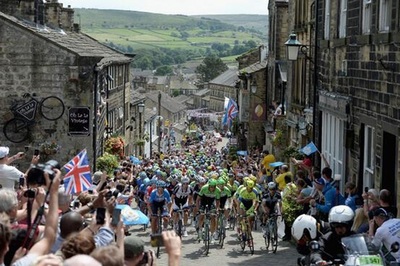While last week saw the launch of Ireland’s prospective RWC 2023 bid and much discussion of related issues like how exciting it will be, how many tourists will come to these shores and how much it will cost, etc., it also saw the release of ‘Three Inspirational Days’, an analysis of the economic impact in the UK of hosting the opening three stages of this year’s Tour de France. Media reports of the study are here and here.
Given past studies of the economic benefits of various sporting events and investments, my expectations for a reasonably accurate estimate were not high. To be fair, however, the report does seem to make a genuine attempt to accurately measure the economic impact, defined as the ‘additional expenditure generated within a defined area as a direct consequence of staging the event’. Firstly, the report states clearly that “The spending of local residents viewing the race where they live is not counted, and neither is the spending of those that were just passing by, termed ‘casual spectators’”. This is a correct starting-point, though it is not clear whether the report considers ‘time-switchers’, those who had planned to visit the relevant areas anyway at some stage but re-arranged their visit to coincide with the Tour. Such individuals should also be excluded from any analysis (except if they spent more while visiting the Tour than they would have at any other time, and only then it is the extra spending that should be included). Also, any possible future effects due to increased tourism and investment are not included in the final figure.
The headline findings of the report are that 3.5m ‘unique’ spectators attended the event over the three days. Of these, 1.3m spectators were from outside the ‘host regions’ of Yorkshire, Cambridge, Essex and London, including 113,000 from outside the UK. The direct economic impact on the ‘host regions’ is estimated at £128m, with an overall UK impact of £33m (the latter figure accounts for the £4m paid for the rights to host the event). Given these, one could infer that there was a £91m substitution effect within the UK.
A number of issues are not clear from the report as it stands. Firstly, while economic impact is important, the true measure of an event’s value is how the direct impact compares to ‘business as usual’ in order to determine the net effect. For instance, the report asked many businesses to compare sales before, during and after the Tour stages to ‘normal’, without stating what normal is. An accurate measure would compare sales outcomes before, during and after the event to an identical period in previous years when the event did not take place. Also, visitors during the Tour may have ‘crowded out’ the usual visitor numbers that would have visited had the stages not taken place, so that the net effect is lower.
The second issue is who bore what costs of hosting the stages. The report talks of £27m being spent but says nothing on whether this spending was within or above any budget. Of this, it seems that £10m is a contribution from UK Sport via national Government. According to the BBC report above, host region local authorities spent £11m of the event’s $27m budget. An important question is where did these monies come from? If from central local and national government, then that is money that could have been spent on something else. While the opportunity cost effects may not have formed part of the report’s remit, any true economic impact study should account for this. Another issue is what counted as direct spending. If, for example, a road on a stage route was resurfaced but would not have been were the Tour not to have taken place, is this included in costs? This is not clear from the report.
As well as the above, an issue alluded to repeatedly but not directly measured in the report is the ‘feelgood’ factor. There seems no doubt that hosting and attending the Tour was something that brought happiness to many people and, ideally, would be included in any benefits.

 RSS Feed
RSS Feed